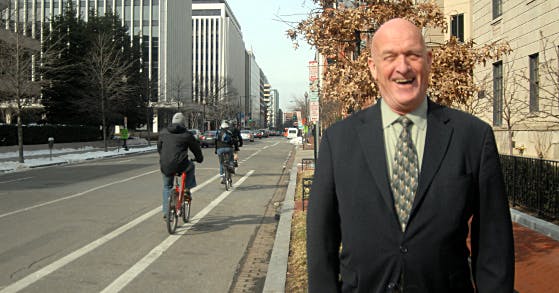From DC,a better way to think about businesses and bike lane battles
By: Michael Andersen

Eventually, everyone redesigning city streets runs into the same problem: small businesses rarely support changes to the roads that bring them customers.
This isn’t because the people who speak for businesses are callous or irrational (despite strong evidence that patrons arriving by bike are often more profitable than those arriving by car). Most businesses tend to resist neighborhood changes for a very simple reason: their businesses are profitable.
For a business, every change to your surroundings introduces risk. And when you’re already turning a profit, what’s the point of risk?
Face disagreements, don’t deny them
So it’s hard to blame any local business for opposing changes like protected bike lanes. In fact, cities should probably expect that most neighboring businesses will oppose projects before they go in — though others, to be sure, will be happy to welcome better biking.
There are two fixes for this standoff:
- Governments should approach street projects in the knowledge that they represent the public’s long-term interest on a street and that there is nothing undemocratic about valuing the public interest, within reason, above current business tenants’ normal and valid desire to minimize short-term risk.
- Nearby businesses should approach street projects in the knowledge that though they have an interest in the street out front, they can’t ultimately control it — and should remember that city governments are often happy to find ways to mitigate any complications their projects cause.
That’s exactly what happened at Washington D.C. hotel The Jefferson, where Director of Risk Management John Stokes decided not to fight City Hall on its plans for a protected bike lane on M Street NW, and found a way to come out ahead.
For The Jefferson, a 99-room boutique hotel a few blocks north of the White House, the new bollard-protected bike lane will mean that taxis and other vehicles won’t be able to make curbside stops alongside the hotel as they previously could. But after talking with the city, Stokes made a deal to allow two new spaces for standing vehicles on 16th Street NW instead — directly outside the hotel’s front door.
Long-term challenge, immediate solution
As a hotel that has no on-site auto parking and rents a few dozen spots in the nearby parking garage for the 20 to 30 percent of guests who bring their own cars, The Jefferson presumably has a long-term financial interest in making the city easy to get around without a car. (It’s experimented with a Thomas Jefferson-themed game designed to be played by families using Capital Bikeshare to see DC.)
“Whatever we do in DC, there will be parking difficulties,” Stokes said. “You can’t get any, and it will never change.”
He said he’s looking for ways to live within that constraint rather than try to wish it away.
“It would be very easy to be negative, but that’s not my style,” the risk manager said. “Most of the things that I’m involved in are problems. I like to see them as opportunities.”
